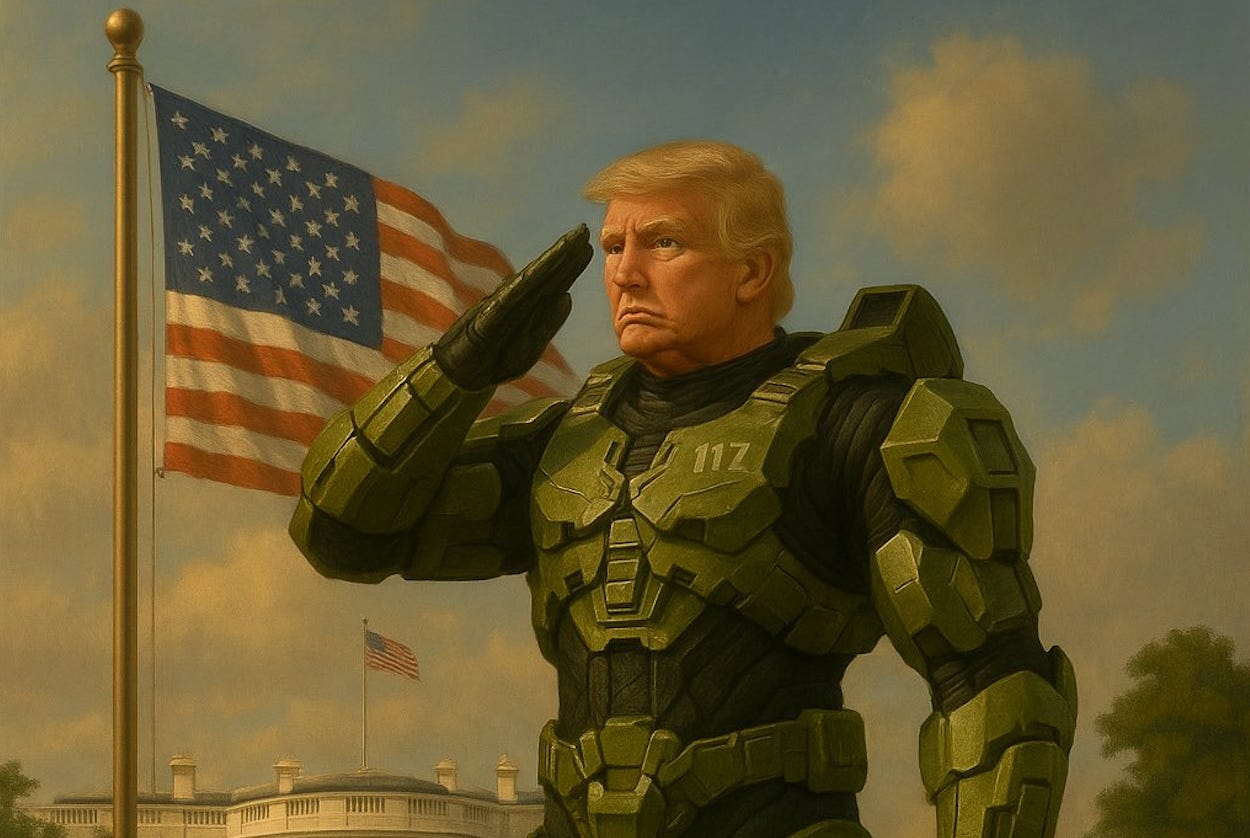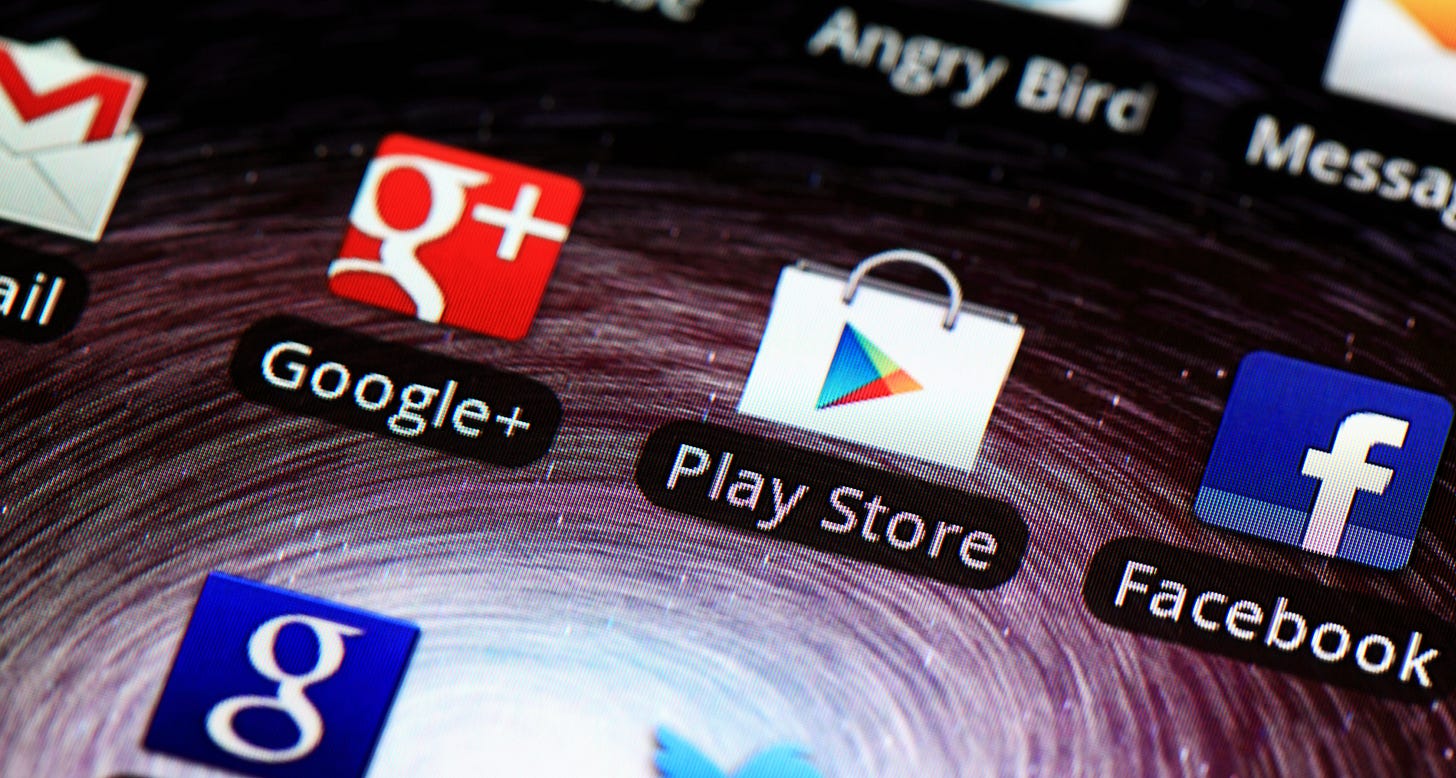Listen now on Apple, Spotify or YouTube
In This Edition
- Governments co-opting video games
- Nintendo Switch 2 sales
- What Google/Epic deal means for mobile devs (Article only)
- Plus! We chat Amazon and retro games
Hello hello! And welcome to your Thursday edition of The Game Business Show.
On the Show (which you can watch or listen to above), I’m joined by George Osborn, he of the Video Game Industry Memo, where we discuss the rise of global Governments utilising video games to influence the population.
We also chat Nintendo financials, Amazon backing away from MMOs and the rise of remakes and remasters.
Of course, if watching/listening isn’t your thing, the articles below covers most of the key points. Plus, there’s a written story about what the proposed deal between Epic and Google over the Google Play Store could mean for mobile studios (the story came in too late for the episode recording, sadly).
Enjoy!
‘The game industry must defend its content from Governments’
There’s a real opportunity for the video game industry to push back against Governments co-opting the medium to deliver their political messages, says leading video game political journalist George Osborn.
On the latest episode of The Game Business Show (check it out above), Osborn discusses the trend of primarily autocratic Governments tapping into the social, cultural and community power of video games.
During the Show, we tackle how major regimes around the world have turned to video games to influence people globally. This ranges from China and Saudi Arabi’s investment in games, Russian propaganda, and even how the US administration has been utilising games such as Halo and Pokémon in its political marketing.
“By co-opting games in this way, they’re actually able to unlock an audience that has got a remarkable amount of influence within the digital landscape, and therefore by extension of the world,” Osborn told us.
“It’s going to be increasingly important that video games companies do the brave thing and start saying: ‘We don’t want our games used for these purposes’, because if anyone else was doing it, we would say something.”
Late last month, US retailer GameStop declared the ‘Console wars are over’ following the news that Halo was coming to PlayStation. This prompted the White House to respond with an AI-generated image of president Donald Trump as Halo protagonist Master Chief. The White House’s official line on the post is that it represented “another war ended under President Trump’s watch”, which is an on-going message that the US administration has been eager to promote.
“This tells us that there is a belief that this iconography has enough resonance, especially within the digital debate, to shape the way people think about it,” Osborn said. “And the fact that that image of Trump ends up being lampooned on Saturday Night Live shows you how quickly an idea that starts in the digital space can suddenly wash its way into the mainstream and influence the way we think.”
“I’m not warning about the dangers of video games. I’m warning about the dangers of not taking video games seriously.”
Osborn explores this and other areas in his upcoming book: Power Play: Video Games, Politics, and the Battle for Global Influence, which is due out in June next year.
“I’m not warning about the dangers of video games,” he stressed. “I’m warning about the dangers of not taking video games seriously. I think there is some real opportunity to push back here, but it just requires everyone, game developers, community managers, people working across the profession, but also politicians, officials, people who fund stuff across civil society to help out with this issue. That’s all in the book.”
Osborn added that companies will need to defend their rights and creative ideas as this usage isn’t going to stop. “You need to make sure you are defending your content and defending your values consistently, even when, frankly, it’s going to be awkward and quite possibly painful.”
In a more positive note, he added: “If games companies push back against some of the tougher things that are happening here, you are going to influence the debate in the right direction. And there are lots and lots of, quote unquote, democratic organizations, the World Health Organization, the United Nations Environment Program, NATIO, who are really starting to take this stuff seriously.”
Check out the full conversation above.
Mobile developers hope new Google/Epic deal will end the “headache” and “mess” of current app store rules
The on-going fight between mobile game developers, Google and Apple just took a major step towards a conclusion.
A new deal struck between Epic Games and Google should pave the way for third-party app stores to be made available on Android devices globally.
Google and Apple have been facing various legal and regulatory challenges that have been forcing them to open up their mobile app stores in certain markets. This includes various cases brought against Google and Apple by Fortnite creator Epic Games.
The objective is to give mobile developers the option of using alternative ways of selling their apps and in-game items, including the ability to sell directly, via alternative app stores and via different payment methods.
Developers have criticised Apple and Google for charging 30% fees on all things sold via the iOS App Store and Google Play Store, particularly during a time when discoverability has become a major obstacle to success on the platforms.
Zynga CEO Frank Gibeau told us: “In the early days, getting App Store placement was a godsend for generating organics. You could build hits by getting that placement and that merchandising on the app stores. It’s just not true anymore. When you look at the marketing and value from some of those programs, it’s diminished completely. So, the question is… how much value am I getting from these fees? It’s just not in balance anymore.”
However, Google and Apple have only been required to open up their stores in certain markets, and even then, not in a consistent way. One mobile developer told us the situation, although “broadly positive”, has become a “growing mess of different rules that have become a headache to manage”.
“These openings are not uniform across the globe,” explains Chris Hewish, who is the president of Xsolla, which works with developers in setting up their direct-to-consumer offerings.
“They are being driven by different regional pressures. Here in the US, it’s through the court cases. In the Europe, you have the Digital Markets Act and other regulatory frameworks. And South Korea and Japan, and a few other places, have regulatory and court-related moves that are forcing some level of opening, whether that’s just being able to steer players outside of the app stores, or putting new payment methods into the app. It is an uneven patchwork of regulations and court cases.”
That’s what makes the new Google and Epic proposal promising for developers. Google had been told by US courts to allow third-party app stores to be downloaded via its Play Store, and to stop restricting customers to the Google Play Billing system. Google has complied with these rulings, but only in the US.
However, the new Google and Epic proposal, which is subject to court approval, would allow third-party app stores to be available on Android devices worldwide. Google also says it will end its 30% fee, and instead charge a 9% or 20% commission, depending on the transaction.
Epic CEO Time Sweeney said on X: “Google has made an awesome proposal to open up Android in the US Epic v Google case and settle our disputes. It genuinely doubles down on Android’s original vision as an open platform to streamline competing store installs globally, reduce service fees for developers on Google Play, and enable third-party in-app and web payments.”
Sweeney added this stands in contrast to “Apple’s model of blocking all competing stores and leaving payments as the only vector for competition.”
Web store businesses booming as app stores open up
Web store businesses, such as Xsolla, are seeing a sharp growth in developers setting up their own stores in order to capitalise on these shifts in the mobile app store marketplace.
This has also driven an increase in competition within the web store space. This includes Epic Games, one of the chief instigators behind the movement, which is offering its own solutions for developers.
“There certainly are a number of other companies moving into the space, and offering various products to help developers benefit from all of this,” acknowledges Xsolla’s Hewish. “But it’s such a big market and opportunity. We were first to market, we’re very, very far out in front of everybody, and we have a sustainable business model.
“This happens any time a new market opens up. You get some VC-backed companies stepping in, you get some established players expanding, but we’ll see over the next 12 to 24 months how that shakes out.”
“There certainly are a number of companies moving into the space, and offering various products to help developers. It’s such a big market and opportunity.”
Hewish adds that this whole shift is not just about developers paying smaller fees, but is should also allow them to have “a better relationship with players, more revenue per paying user, higher engagement and new forms of user acquisition and discovery.”
It’s a view shared by Zynga’s Gibeau: “It’s not just about making more margin, we can perform better CRM, we can build better communities, we can understand more clearly what’s happening in the games… the idea that we can communicate with our players in a much more direct manner is going to create a more valuable relationship.”
Meanwhile…
Nintendo has raised its Switch 2 shipments estimate from 15 million to 19 million for the financial year. It follows the firm’s Q2 financial report, which revealed the company has now sold-in 10.36 million Switch 2 units since its launch in June. Switch 2 is the fastest selling games console in history, boosted by strong supply since its release in June.
Disagreements between the International Olympic Committee and Saudi Arabia has led to the cancellation of the inaugural Olympic Esports Games in 2027. The IOC says it is looking to develop a new approach and a new partnership model related to esports. Much of the issues surrounded disputes between the various parties over governance, the challenges of meeting Olympic rules, and who ultimately had control over the project.
$1.4 billion was spent on remakes and remasters during 2024 and 2025, says data specialist Ampere. The data covers Xbox, PlayStation and Steam, and doesn’t include Nintendo, or specialist retro stores such as GOG. Based on a study of 42 titles, the average remake generated 2.2 times more consumer spending than the average remaster.
Join us back here tomorrow for an interview with Take-Two CEO Strauss Zelnick and the latest European charts! Until then, thank you for reading.













